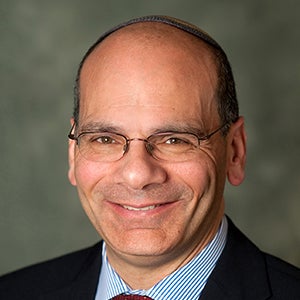April 19, 2024
How does one celebrate Passover and sing the songs of jubilation when Israel and the Jewish people feel – and actually are – so threatened? The Seder and the Haggadah (literally, the telling) tell us how to do it.
Denialism is not an option, the reality is not good, yet perspective and hope (tikvah) are a must. Nowhere is this more palpable than in Israel, today’s Jewish centerpiece.
I just returned from the Holy City, on my second solidarity visit since October 7. Jerusalem often presents a surprisingly peaceful sea of tranquility, even featuring glimmers of coexistence among diverse Jews and between faiths.
When we arrived, the mad rush toward Passover preparation had begun. Ramadan had drawn to a close and the three-day celebratory Eid was underway. Orthodox Christians awaited their Easter with great anticipation. Muslims in their holiday finery, Jews in their full mosaic of identity, and a smattering of the visibly Christian strolled the Mamilla outdoor mall which literally and proverbially connects the West and East of a theoretically undivided Jerusalem. Yet scratch the surface and you will reveal a host of tension that belies the calm.
Iran came out of the shadows of its innumerable proxies and blatantly asserted its commitment to erase the State of Israel and the Jewish people. After hundreds of deadly projectiles were launched at Israel, sirens sounded in the middle of the night, and we took cover in the shelters. But Israel and an amazing array of coalition partners, not least the United States, took to the skies and made clear that the course of Jewish history has been changed forever.
The Jewish people can and will defend itself. We have come a long way from the Shoah, notwithstanding the unbearable and enduring pain of October 7 and the frightening rise of antisemitism in America and beyond. We sometimes feel very alone and need to be reminded that we have many friends.
I was in Israel on behalf of American Jewish Committee (AJC) to facilitate and participate in the Israel and Jewish solidarity moments of our dear friend, Archbishop of New York Cardinal Timothy Dolan, an undauntedly singular voice of support for Israel and the Jewish people since October 7. Our time together began with a memorable Shabbat dinner and included an inspirational meeting with President Isaac Herzog. And Cardinal Dolan experienced a definitional aspect of Israeli life – racing to safe rooms or shelters in the middle of the night in response to sirens and rockets.
But it was the multiple encounters with the October 7 victims, mourners, and hostage family members that left us simultaneously breathless and hopeful. To be in the presence of these holy ones, to listen to their stories and pain, to be stirred by their belief in goodness in the face of true evil, to embrace them as they face Seders with empty chairs. They and their loved ones can never be secondary. They are primary. We must all do whatever we can to #BringThemHomeNow.
The Seder (literally, the order) will be our guide as it always is. Not all bitter. Not all sweet. An amalgam of bittersweet with a triumph of concluding hope. The greens of spring’s renewal dipped in salty water. Matzah being both the bread of affliction and the bread of liberation. The bitter herbs mixed with the sweet haroset. “In every generation there are those who seek our destruction” balanced by “the Holy One . . . saves us from their hands.”
Even as Israel is at war, as all the hostages are not yet home, as our young people on campuses are a new front line for the Jewish people, as my two nephews and their fellow Israel Defense Forces’ heroes are in harm’s way, we will do what we always do: tell the story of enslavement; recall and recommit to the unending promise of redemption and freedom; renew our confidence in the eternity of the Jewish people; and reaffirm our belief in Tzelem Elohim, the Divine Image within all of humanity.
And, as we always do in our home – do try it – we will yet again dance with wild abandon around our Seder table to the words which end the Maggid (literally, the telling) section and the Seder itself, respectively: “We shall sing before God a new song, Halleluyah,” and “Next Year in Jerusalem,” our perpetual aspirations.
Bitter. Sweet. Hope. Am Yisrael Chai. Chag Sameach.
Rabbi Noam Marans is AJC Director, Interreligious and Intergroup Relations.



